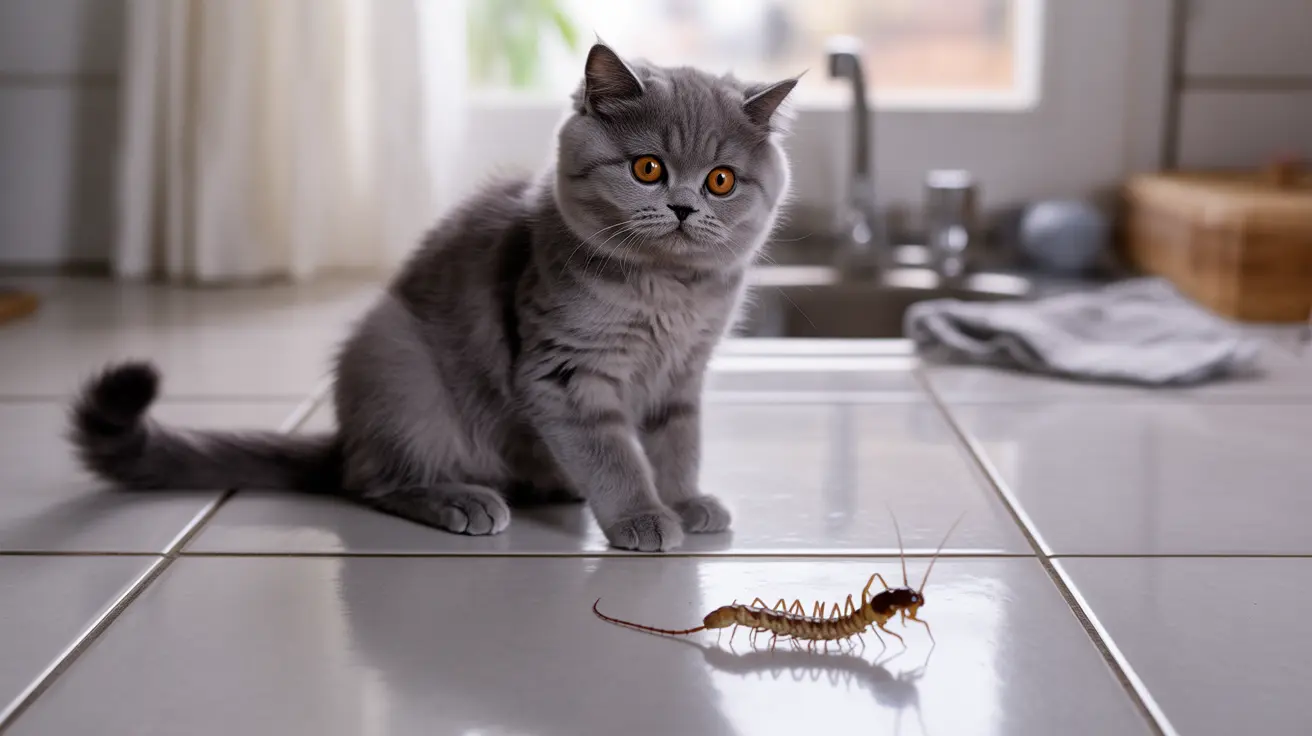Understanding the Cat-Centipede Dynamic
Cats are natural hunters with an instinct to chase and catch moving prey. House centipedes, with their rapid movements and multiple legs, often trigger this predatory response. While most cats will pursue centipedes out of curiosity or hunting instinct, not all will actually consume them after the catch.
Common House Centipedes vs. Dangerous Species
Most house centipedes (Scutigera coleoptrata) are relatively harmless to cats. These small creatures, typically measuring less than two inches, possess venom that's too weak to cause significant harm to your feline companion.
However, larger species like the Giant Desert Centipede or Texas Redheaded Centipede can pose serious risks. These specimens can grow up to 8 inches long and pack a more potent venom that could potentially harm your cat.
Health Risks and Symptoms to Watch For
Mild Reactions
If your cat encounters a common house centipede, you might notice:
- Minor swelling or redness at the bite site
- Temporary discomfort
- Mild itching
- Occasional vomiting (usually from ingesting the centipede)
Severe Reactions
In rare cases involving larger or more venomous species, watch for:
- Significant swelling around the face or bite area
- Persistent vomiting
- Lethargy or weakness
- Fever
- Signs of pain or distress
Prevention and Home Safety
To minimize risks associated with centipede encounters:
- Seal entry points around your home
- Keep basements and bathrooms dry
- Remove hiding spots like leaf piles near entrances
- Consider using pet-safe pest control methods
- Monitor your cat's outdoor activities in regions known for dangerous centipede species
When to Seek Veterinary Care
While most centipede encounters don't require medical attention, contact your veterinarian if you notice:
- Severe swelling or infection at the bite site
- Prolonged vomiting or diarrhea
- Unusual lethargy or behavioral changes
- Signs of allergic reaction
- Any concerning symptoms after encountering larger centipede species
Frequently Asked Questions
Can cats safely eat common house centipedes without health risks?
Yes, most house centipedes are harmless if eaten by cats. Their venom is too weak to cause significant problems, though occasional mild stomach upset may occur.
What symptoms should I watch for if my cat gets bitten by a centipede?
Monitor for localized swelling, redness, or itching at the bite site. Severe symptoms like persistent vomiting, lethargy, or fever warrant immediate veterinary attention.
Are larger or exotic centipedes dangerous to cats and what should I do if exposed?
Yes, larger centipedes like the Giant Desert Centipede can be dangerous to cats. If your cat encounters one, seek immediate veterinary care, especially if showing signs of distress or illness.
Do centipedes provide any nutritional benefits to cats?
No, centipedes offer no significant nutritional value for cats. Cats are obligate carnivores and should receive their nutrition from proper cat food rather than insects.
How can I prevent my cat from encountering harmful centipedes indoors?
Maintain a dry environment, seal entry points, reduce clutter, and consider using pet-safe pest control methods. Regular home inspection and maintenance can help minimize centipede populations.
While most centipede encounters are harmless, being informed about the potential risks and knowing when to seek help ensures your cat's safety. Focus on prevention and maintain awareness of the centipede species common in your area to best protect your feline friend.






